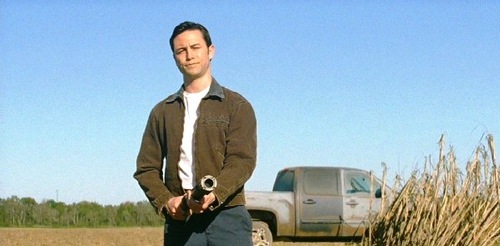Time travel, as we all know, is (1) impossible in any real-life, non-quantum sense, and (2) irresistible to filmmakers. Rian Johnson‘s Toronto entry “Looper” asks us to accept it as a premise, and you know what? It’s handled more realistically here than anything in the plots of the average superhero movie. One of the strengths of time travel is its demonstration that if we could travel through time and meet our parents or even ourselves at an earlier age, it could be an unbearably emotional experience.
That’s what happens in “Looper,” although the emotion goes astray somewhat when two manifestations of the same person are entangled in a murder scheme by organized crime. Here is the ingenious scheme: In order to murder someone and not leave a trace, the syndicate ships them back in time, so they can be murdered and their bodies disposed of then. Joseph Gordon-Levitt plays Joe, a Looper who in 2044 spreads a sheet on the ground, waits for a hooded and handcuffed man to appear out of thin air, and kills him. Bruce Willis plays the same character, Joe, who is sent back from 2077 for young Joe to kill him. (Killing yourself at an older age is known as “closing the loop”).
This takes place largely on a Kansas farm occupied by Sara (Emily Blunt) and her son, who young Joe grows close to. Old Joe, on the other hand, has a secret agenda inspired by the loss of the love of his life. This plot by Johnson gets high marks for ingenuity, and especially for the implacable logic with which it ends. But in scenes where Young and Old Joe meet in a 2044 Kansas diner, there’s a curious coldness. What would you feel if Old You and Young You met? Maybe Loopers are emotionally detached as a job qualification. No matter. The movie is strangely effective. It opens nationally on Sept. 28.
• • • •
 “A Royal Affair“ is a first-rate historical drama based on a romance that changed history. In Denmark, circa 1800, a fragrant young virgin named Caroline Mathilde (Alicia Vikander) is selected to marry the feckless King Christian VII (Mikkel Boe Folsgaard), an idiotic spoiled brat who values his cute little dog above all else. The kingdom is effectively ruled by a council, mostly concerned with using Christian VII to feather their own nests and continue their policies of exploiting the working classes. Sone royals exiled from his circle make a tour and meet a young German doctor named Johann Struensee (played by Mads Mikkelsen, an actor who seems destined to become the next international star from Europe.). They introduce him to the King in hopes of ingratiating themselves
“A Royal Affair“ is a first-rate historical drama based on a romance that changed history. In Denmark, circa 1800, a fragrant young virgin named Caroline Mathilde (Alicia Vikander) is selected to marry the feckless King Christian VII (Mikkel Boe Folsgaard), an idiotic spoiled brat who values his cute little dog above all else. The kingdom is effectively ruled by a council, mostly concerned with using Christian VII to feather their own nests and continue their policies of exploiting the working classes. Sone royals exiled from his circle make a tour and meet a young German doctor named Johann Struensee (played by Mads Mikkelsen, an actor who seems destined to become the next international star from Europe.). They introduce him to the King in hopes of ingratiating themselves
Johann is an intellectual, a follower of Voltaire, a social reformer. Caroline is very smart, uneducated, left physically cold by her goofy husband. The king reserves more affection for his doggie, and is regarded by his cabinet as a moronic but useful puppet. Nevertheless, Caroline is in fact the queen and wields great power, and under the subtle and crafty tutelage of the two of them, the King begins to declare various social reforms, to the horror of his puppet-masters. What’s this? Will the backward Denmark join the rest of Europe in joining the Enlightenment?
This is the first feature written and directed by Nikolaj Arcel, who earlier wrote “The Girl with the Dragon Tattoo” (2010). His sense of period is accurate, his locations and costumes persuasive, and the plot slides easily from comedy into serious drama. It is a dangerous matter to steal not only a king’s wife, but his prerogatives. As the king, Mikkel Boe Følsgaard portrays a man who may be a fool, but has an engaging innocence. The film opens on Nov. 9.
• • • •
 One of the tales of folklore around Alcoholics Anonymous is that if your spouse joins AA, “it” will take him or her away from you. What’s much more likely to happen is that if your spouse sobers up and you continue to drink alcoholically, your partner may no longer be able to stand you. Marriages have been saved by AA, but usually when both drinking spouses sober up, or if one already is. If a spouse wants you to continue drinking just to be good company, what does that say about that person?
One of the tales of folklore around Alcoholics Anonymous is that if your spouse joins AA, “it” will take him or her away from you. What’s much more likely to happen is that if your spouse sobers up and you continue to drink alcoholically, your partner may no longer be able to stand you. Marriages have been saved by AA, but usually when both drinking spouses sober up, or if one already is. If a spouse wants you to continue drinking just to be good company, what does that say about that person?
James Ponsoldt‘s Toronto entry “Smashed“ is an intelligent film about marriage and alcoholism. Mary Elizabeth Winstead stars as Kate, a maintenance drinker who steals a swing of beer after her morning shower and sips from a flask in the parking lot outside her job–as a grade school teacher. Non-alcoholics may find it difficult to understand how common a version of this behavior is. Drinkers may find it quite possible that she pukes into a wastebasket in front of her kids.
Finally dragged to an AA meeting by a colleague, Kate meets Jenny (Octavia Spencer, who you may remember as the most sensible character in “The Help,” for which she won an Oscar as best supporting actress). Her new life doesn’t much interest Kate’s husband Charlie (Aaron Paul) or her boozy mom (Mary Kay Place, in a spot-on performance). Give Charlie credit: As long as he stays topped up, he doesn’t much mind how Kate spends her evenings. Eventually she will begin minding how he spend his. (This films opens Oct. 12.)












